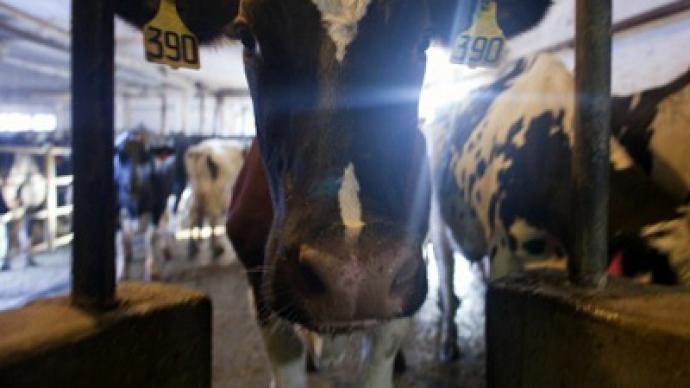Welcome to the Jungle: States demand secrecy over meat filth and cruelty practices

If you're concerned with how some factory farms might be handling their livestock, two US states have made it illegal to conduct undercover investigations — and now animal rights activists and whistleblowers alike have a bone to pick with lawmakers.
Only four months into 2012, Utah and Idaho have passed legislation that outlaws going undercover to investigate conditions and conduct inside the confines of factory farms — and now authorities in Missouri are coming close to approving a similar “Ag-gag” act. If passed before the end of April, the Show Me State will become the third state in only two months to tell investigative journalists and whistleblowers alike to forego following leads concerning agricultural operations or else face the consequences.Last month Iowa approved House File 589, a legislation advertised as outlawing “agricultural production facility fraud.” Once Governor Terry E. Branstad signed the act into law in early March, police and prosecutors in Iowa were allowed the power to bring criminal charges against anyone who enters farming facilities by means of deception. The act was touted as a way of keeping agriculturists within the state from having outsiders infiltrate harm to their businesses, however, opponents of the law say that farmers were upset over how video footage and other information captured from their facilities were introducing information to the public that would cut profits by way of revealing the real conditions that livestock are subjected to. Mercy for Animals, an advocacy group, is opposed to House File 589 on grounds that it makes anyone who "expose cruelty to animals, corporate corruption, dangerous working conditions, environmental violation, or food safety concerns at factory farms” a criminal in the eyes of the state. The American Veterinary Medical Association explains in their own report that in the last three years, Mercy for Animals has released footage that shows abuse within Iowa farming facilities, which means that the state can now prosecute journalists that obtain that footage by surreptitious means with the alleged intent of harming business.Those trying to overturn these new Ag-gag laws say they are only trying to prevent the harming of animals. State leaders seeking approval of an Ag-gag act in Missouri insist they are fighting a politically-motivated agenda waged by activists that are only trying to disrupt the business.“Unfortunately we live in a society where these activists are becoming more and more of a problem to agriculture,” Missouri State Rep. Casey Guernsey, R-Bethany, explains to the News-Leader while supporting the proposed measure in his state. “We cannot afford to allow these groups to target our industry of agriculture in Missouri like they have in Iowa.”Missouri State Rep. Ed Schieffer, D-Troy, adds that the law is necessary to nix animal rights opponents from decimating the business any further. “Agriculture as we know it is in danger from outside influences and outside fears,” he tells the News-Leader.Outside influence that falls under the category of a criminal offense in both Utah and Idaho now has been instrumental in bringing much needed reform to the United States in the past, however. A century earlier, journalist Upton Sinclair uncovered conditions within Chicago’s meatpacking plants in his iconic exposé The Jungle, which in turn caused the United States to pass both the Meat Inspection Act and the Pure Food and Drug Act of 1906, which in turn would lead to the eventual creation the Food and Drug Administration decades later.Muckrakers aspiring to emulate Sinclair’s work will now be charged for carrying out similar investigations though, and critics are already asking for repeal against laws that encourage animal cruelty and also crumble a hefty clause of the First Amendment: the freedom of the press."This flawed and misdirected legislation could set a dangerous precedent nationwide by throwing shut the doors to industrial factory farms and allowing animal abuse, environmental violations, and food contamination issues to flourish undetected, unchallenged and unaddressed," says Nathan Runkle of Food Safety News."This law is un-American and a broad government overreach," adds Runkle. "It seeks to shield animal abusers from public scrutiny and prosecute the brave whistleblowers who dare to speak out against animal cruelty, environmental pollution and corporate corruption."Runkle is far from alone in his opposition, but his criticism is being countered by Congress already. Iowa State Rep. Annette Sweeney, executive director of the Iowa Angus Association, writes in a Des Moines Register op-ed that the state’s agriculture industry is being threatened by “political activist groups trying to grab national headlines,” and that laws like the new Ag-gag legislation will reverse that trend. “H.F. 589 reinforces the right of Iowa’s farmers to be the best in the world without being exposed to ever-accelerating political extremist criminal activity,” adds Sweeney.Others, of course, beg to differ. “They prefer having no rules on how they treat animals and no one from the public second-guessing what they do,” journalist Cody Carlson says of the laws’ supporters in an op-ed published last month in The Atlantic. Carlson went undercover at Iowa egg farms for a few months in 2010 and experienced what he now describes as “disturbing trends of extreme animal cruelty and dangerously unsanitary conditions.”Ag-gag laws, of course, will change all of that.“As one of the people this new law is designed to silence, I'm concerned that Iowa is shooting the messenger while letting the real criminals go unpunished,” says Carlson.














